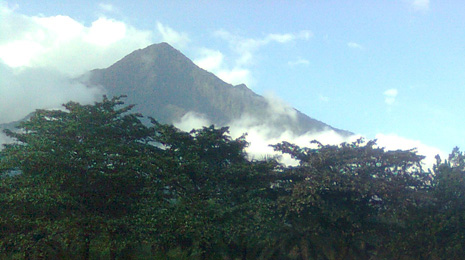The History of Post-Verbal Negation in African Languages
August 23, 2012, Buea, Cameroon
Maud Devos (Royal Museum for Central Africa, Tervuren)
Dmitry Idiatov (CNRS-LLACAN, Paris)
Description:
Notwithstanding a cross-linguistic tendency for negative markers to occur before the verb (Dryer 1988) there is an area in Africa where post-verbal negative markers abound. Following Dryer (2009:307) this area “stretches from Nigeria across to the Central African Republic and down into the northern Democratic Republic of the Congo”. This region overlaps with the “hotbed” of a large linguistic area referred to by Güldemann (2008) as the Macro-Sudan belt. The proposed workshop aims at a better understanding of the typologically unusual phenomenon of post-verbal negative markers and its history in the African context. We invite papers that take a closer look at post-verbal negative markers in African languages (within and beyond the area described above) and contribute to one of the following topics (or another topic relevant to post-verbal negation):
- The position of the post-verbal negative marker: In the area identified by Dryer the post-verbal negative markers typically occur “at the end of the clause, following any adverbs or adjunct phrases” (Dryer 2009:307). Outside the area the position of the post-verbal negative marker shows more variation. Data, mostly from Bantu languages, show that the post-verbal negative marker may also occur immediately after the verb (Devos et al. 2010), or that (pragmatically motivated) variation is possible (Odden 1996, Philippson & Nurse 2000).
- The etymology of the post-verbal negative marker: What is the source of the post-verbal negative marker and especially are non-negative source meanings as suggested for Metta (Grassfields Bantu, Mihas 2009), Senufo (Gur, Carlson 1994), Ma (Adamawa-Ubangi, Tucker and Bryan 1966) and a number of Bantu languages (Devos & van der Auwera forthcoming) a recurrent phenomenon?
- Post-verbal negative markers and “Jespersen Cycles”: For Bantu languages it has been suggested that post-verbal negative markers were originally used to reinforce negation and a fair number of Bantu languages display double, even triple negation. How valid is the Jespersen Cycle as a historical explanation for post-verbal negative markers in Africa and how recurrent is triple negation (involving post-verbal negative markers)?
- Post-verbal negative markers and language contact: Following Güldemann (2008) post-verbal negation, more precisely the V-O-Neg word order pattern, is one of the linguistic features relevant for the Macro-Sudan belt. How does such a pattern diffuse? Nurse (2008:180) notes that some of the post-verbal negative markers in Bantu languages are Wanderwörter; they are easily transferred from one language to another. Do we find clear cases of borrowed post-verbal negative markers or is contact-induced grammaticalization (Beyer 2009) a more plausible scenario?
- Stability of post-verbal negative markers: Can post-verbal negative markers be reconstructed for any significant time-depth, such as the level of a proto-family or a major branch of a family?
Beyer, Klaus. 2009. Double negation-marking: a case of contact-induced grammaticalization in West Africa? In Norbert Cyffer, Erwin Ebermann & Georg Ziegelmeyer (eds.), Negation patterns in West African languages and beyond, 205-222. Amsterdam: John Benjamins.

Carlson, R. J. 1994. A grammar of Supyire. Berlin: Mouton de Gruyter.

Cyffer, Norbert, Erwin Ebermann & Georg Ziegelmeyer (eds.). 2009. Negation patterns in West African languages and beyond. Amsterdam: John Benjamins.

Güldemann, Tom. 2008. The Macro-Sudan belt: towards identifying a linguistic area in northern sub-Saharan Africa. In Bernd Heine & Derek Nurse (eds.), A linguistic geography of Africa, 151-185. Cambridge: Cambridge University Press.

Devos, Maud, Michael Tshibanda Kasombo & Johan van der Auwera. 2010. Jespersen cycles in Kanincin: double, triple and maybe even quadruple negation. Africana Linguistica XVI, 155-181.

Devos, Maud & Johan van der Auwera. forthcoming. Jespersen Cycles in Bantu: double and triple negation.

Dryer, Matthew S. 1988. Universals of negative position. In Michael Hammond, Edith Moravcsik & Jessica Wirth (eds.), Studies in syntactic typology, 93-124. Amsterdam: John Benjamins.

Dryer, Matthew S. 2009. Verb-object-negative order in Central Africa. In Norbert Cyffer, Erwin Ebermann & Georg Ziegelmeyer (eds.), Negation patterns in West African languages and beyond, 307-362. Amsterdam: John Benjamins.

Mihas, E. 2009. Negation in Metta. Rice Working Papers in Linguistics 1: 197-222.

Nurse, Derek. 2008. Tense and Aspect in Bantu. Oxford: Oxford University Press.

Odden, D. 1996. The phonology and morphology of Kimatuumbi. Oxford: Clarendon Press.

Philippson, Gérard & Derek Nurse. 2000. Gweno, a little known Bantu language of Northern Tanzania. In Kitore Kahigi & Maarten Mous (eds.), Lugha za Tanzania / Languages of Tanzania, 233-84. Leiden: CNWS.

Tucker, A.N. & M. A., Bryan.1966. Linguistic analyses. The non-Bantu languages of North-eastern Africa. Oxford: Oxford University Press.
Presentations:
Ekkehard H. Wolff
(Leipzig University & Adama University)
On post-verbal negation in Chadic
[abstract]  [presentation]
[presentation]
Melanie Viljoen
(Research Centre for Linguistic Typology, La Trobe University & SIL Cameroon)
Negation in Buwal: Order, form and meaning
[abstract] [presentation]
[presentation]
Dmitry Idiatov
(CNRS-LLACAN)
On the history of clause-final negation in the Mande languages of the Bani - upper Mouhoun rivers area
[abstract]  [presentation]
[presentation]
Sabine Littig & Ulrich Kleinewillinghöfer
(Gutenberg Universität, Mainz)
Negation patterns in Sama-Duru languages (Central Adamawa)
[abstract]  [presentation]
[presentation]
Paulette Roulo-Doko
(LLACAN-CNRS)
Le marqueur de négation ná en gbaya
[abstract]  [presentation]
[presentation]
Maud Devos
(Royal Museum for Central Africa, Tervuren)
Possessive pronouns as post-verbal negative markers in Bantu languages: functional motivation and history
[abstract]  [presentation]
[presentation]
Eva-Marie Ström
(University of Gothenburg)
Locative interrogative as origin of the postverbal negative marker in Ndengeleko
[abstract]  [presentation]
[presentation]
Vera Wilhelmsen
(Uppsala University)
Post-verbal negation in Rangi (F33) and Mbugwe (F34): a Jespersen's cycle
[abstract]  [presentation]
[presentation]
Helma Pasch
(Universität zu Köln)
Negation patterns in Zande
[abstract]  [presentation]
[presentation]


